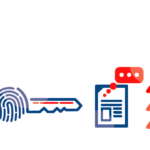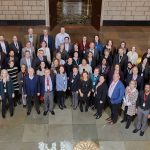This week, we highlight upcoming events, including EMWA’s mini symposium on PLS and Evidence Week in Parliament at Westminster 2022. We hear about eLife’s new publication model, a free symposium on digital health, and a podcast on how the digital world is affecting scientific communications. Finally, we read about ISC’s 2022–2024 open science action plan, a review of the last 14 years of Open Access Week by PLOS, and an article discussing the future of publisher–partner models.
To engage with:
EMWA mini symposium on PLS via EMWA
The 54th European Medical Writers Association (EMWA) conference – this year in Riga, Latvia – is fast approaching! As part of the conference, experts on plain language summaries (PLS) Slavka Baronikova and Open Pharma’s very own Adeline Rosenberg will host a mini symposium on the use of PLS for scientific publications. The symposium will be a hybrid event, taking place at 13:30–17:00 EET on 4 November 2022. You can find further details and register for the symposium here. This year’s EMWA will take place on 3–5 November, and you can find out more information here.
Evidence Week in Parliament at Westminster 2022 via Sense about Science
Policy decisions occurring in government that relate to science and medicine must be guided by evidence. Evidence Week in Parliament at Westminster – the heart of the UK parliamentary system – is therefore an excellent opportunity for researchers, politicians and the wider public to share knowledge and insights that will help guide politicians to better evaluate evidence. This year’s Evidence Week will take place on 14–18 November 2022, with a packed programme of events throughout the week, both virtually and in person. You can take part in Evidence Week by clicking here!
A day in the eLife: a new publication model via eLife
eLife, an independent, non-profit and open access journal in the biomedical and life sciences, has announced that, from 2023, it “will no longer make accept/reject decisions at the end of the peer-review process”. Instead, eLife will publish all peer-reviewed papers on their website as “reviewed preprints”. These preprints will be published alongside the peer review, as well as public reviews, and will also allow authors to respond. Authors can then either revise and resubmit, or declare the preprint version as the final version. To read more behind why eLife has decided to change its model, you can read this article by the eLife editors. The announcement has raised many questions within the scientific publishing community and, as a result, eLife has provided an FAQ list on their new model.
Digital health: the undeniable future of medicine? via HITLAB
Digital health is a rapidly evolving field in contemporary medicine that is defined by digital tools that improve and personalize healthcare, such as mobile phones, wearable devices, telemedicine and much more. Focused on this subject, HITLAB host a monthly symposium on digital health with October’s symposium titled Digital Health & Human Rights. October’s symposium included panel discussions, interviews and keynote speakers from leaders in the digital health field, such as Catherine Skobe (Publications Innovative Solutions Lead at Pfizer), Chris Winchester (CEO at Oxford PharmaGenesis) and Bill Taranto (President of Merck Global Health Innovation Fund). The symposium took place on 27 October and will soon be free to watch on HITLAB’s YouTube channel. So, watch this space!
To listen to:
How the digital world is transforming scientific communications via MAPS | 15-minute listen
The Medical Affairs Professional Society (MAPS) are hosting a new podcast series on how the digital world is transforming scientific communications. In the second podcast of the series, Jennifer Riggins (President of Medical Affairs and Digital at JSR Medical Affairs Consulting) and Stephen Casey (Managing Partner at Omni Healthcare Communications) are joined by Catherine Skobe (Publications Innovative Solutions Lead at Pfizer) to discuss the pharma perspective on the digital landscape of open access scientific publishing. You can listen to the previous episode of the new podcast series here.
To read:
ISC’s 2022–2024 open science action plan via International Science Council | 1-hour read
With International Open Access Week coming to a close, the International Science Council (ISC) has released its open science action plan for 2022–2024. This action plan contains a portfolio of work and prioritizes what ISC wants to achieve over the coming years. These priorities include ‘science in policy and public discourse’, ‘changing practices in science and science systems’, ‘freedom and responsibility in science’, ‘converging science and technology in a digital era’ and ‘global sustainability’. Through these priorities, the ISC hopes to promote international and collaborative open science to tackle the key global challenges of our time.
PLOS memories of Open Access Weeks gone by via PLOS | 6-minute read
As a co-founder of International Open Access Week, PLOS has celebrated 14 years of the event with this article looking back at their favourite memories from Open Access Weeks gone by. With memories such as the first Open Access Week in 2009 to the first with a theme in 2012, this article details how Open Access Week has grown and evolved, and looks at what the future holds for open science.
The endgame for the publisher–society partner model? via The Scholarly Kitchen | 6-minute read
Traditional publishing agreements between society partners and publishers exist as a profit-sharing model. These agreements have advantages and disadvantages for both the society partners and the publishers that agree to them. But these agreements may not be future-proof with the recent rise of mandates that push publishing towards article-processing charge (APC)-funded open access. Now, potentially leading the publisher–society partner model towards its endgame, Wiley has announced their new division called Wiley Partner Solutions (WPS). Through WPS, instead of full partnership, the publisher is now a paid supplier of services to the society, with the financial risks associated now shifted entirely to the society partner. This article provides a detailed overlook of the pros and cons of this new approach.
Have you watched our Open Pharma Symposium ‘Who can we trust? Open science and pharma research’? Watch it here on our YouTube channel!






